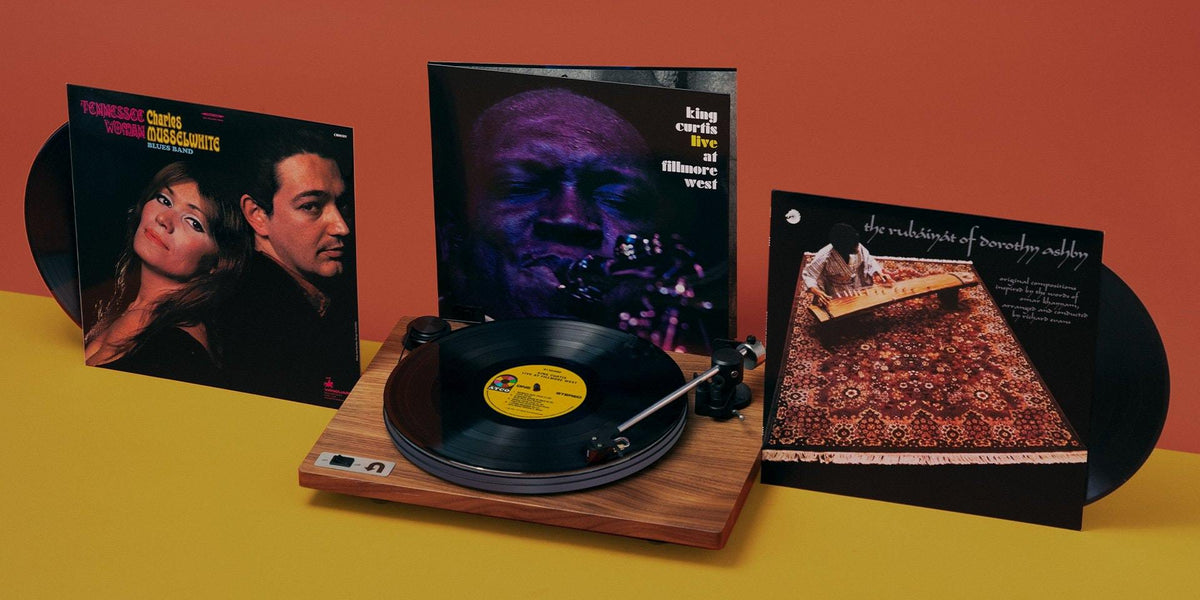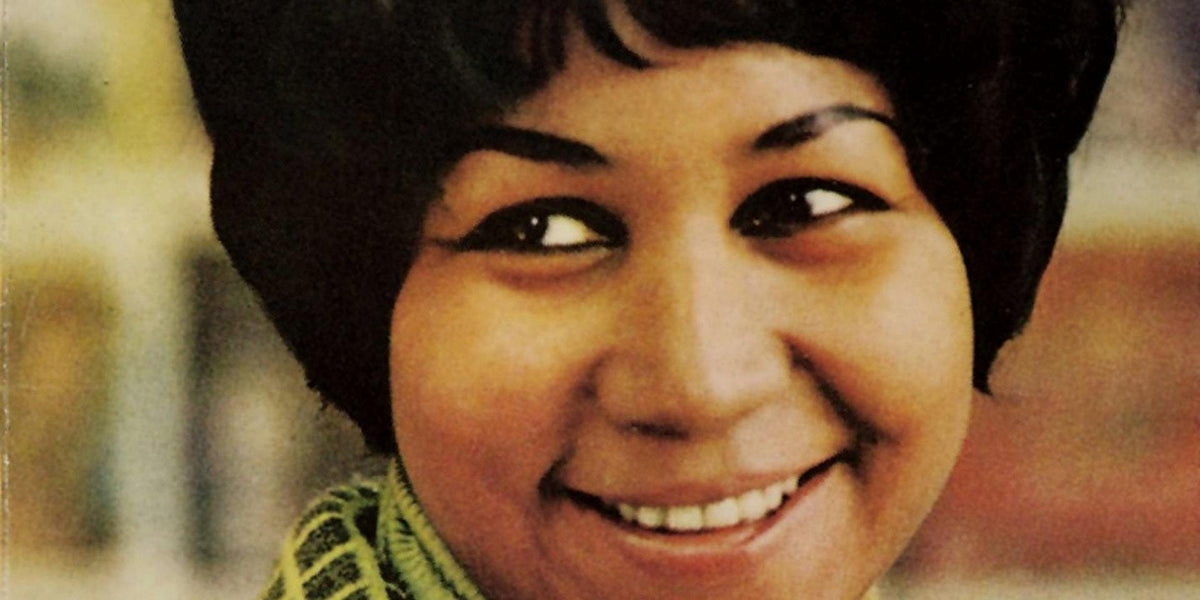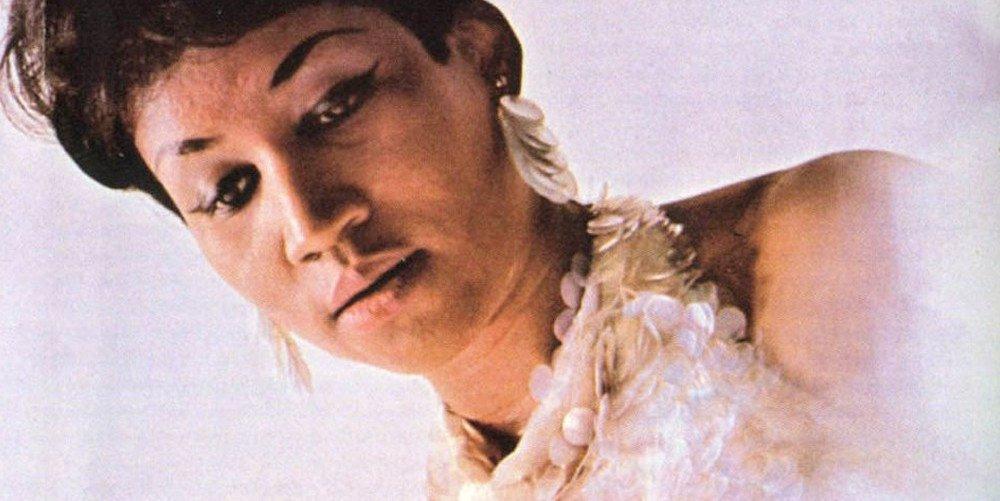King Curtis’ Immortal Night in San Francisco
Read Our Listening Notes for ‘Live At Fillmore West’
Aretha Franklin’s 1971 stand at the Fillmore West was meant, by her and her longtime producer Jerry Wexler, as a coronation. She’d spent the better part of the previous five years at the top of the charts, turning albums like I Never Loved a Man the Way I Love You (VMP Essentials No. 84), Aretha Now (VMP Classics No. 33) and Lady Soul into canonical classics, and even conquered Europe, thanks to a brief tour and the album Aretha in Paris. She toured stadiums around the U.S., but Wexler and Franklin were curious how deep her crossover actually was. Would she go over with the crowd used to seeing the Grateful Dead or Janis Joplin or the Allman Brothers Band? It was a moment to test Franklin’s mettle on an away court, the musical version of a football team being so dominant that they decided it’s time to conquer baseball, too.
Promoter Bill Graham couldn’t afford Franklin’s fee, so Atlantic Records made up the difference, and paid Aretha for her shows, and recorded an album that would see release as Aretha Live at Fillmore West. For Franklin’s run at the Fillmore — three nights, March 5-7 — she and Wexler decided on a set list that would speak to the longhairs in attendance. Gone were the slower ballads and standards of Aretha in Paris, and in their place were covers of Stephen Stills, Simon & Garfunkel and Beatles songs. It, as you can hear on the 1971 album, went over better than anyone could have hoped.
“I’ve played a million gigs,” organist Billy Preston told David Ritz for Respect: The Life of Aretha Franklin. “I’ve played a million churches, a million buckets of blood, a million nightclubs, and a million concert halls. But never, ever have I experienced anything like playing for Aretha at the Fillmore. It wasn’t that the hippies just liked her. They went out of their minds. They lost it completely. The hippies flipped the fuck out.”
Preston was playing that night as Aretha’s organist, and on the complete release of the three shows that came a few years ago, you can hear him perform his eventual hit, a cover of George Harrison’s “My Sweet Lord,” each night. But Preston wasn’t leading the band, and hadn’t even been responsible for putting it together; the future star was sitting in as added muscle. When it came time to book the band backing Franklin up at the Fillmore, Wexler and Franklin needed a band that could rock and could pull off being the tightest soul outfit running, especially since Booker T. and the M.G.’s had folded up shop by then. They’d open the shows, and then back up Franklin. There could be only one choice. The man who played the sax lines on “Respect,” and who more or less presented the saxophone in rock ’n’ roll from the very beginning of the genre. A man who’d be dead a mere week after he released an album of his band’s own set at the Fillmore.
That man was, of course, King Curtis, and his band the Kingpins.
It’s highly possible that until reading this, you had never heard of King Curtis. But without reservation, I can guarantee that you’ve heard the sax of King Curtis. He’s one of the many men of various stages of notoriety who gave early rock ’n’ roll and soul music its verve, its punch, its panache and by the time he led the Kingpins into the Fillmore West, opening for Aretha and then also serving as her backing band for her set, he’d lived multiple musical lives.
Born in 1934 in Fort Worth, Texas, he grew up idolizing heroes of the sax, like Coleman Hawkins, Lester Young and Dexter Gordon. Because Fort Worth didn’t have as much of a jazz scene as it did a party band scene, Curtis became well-versed in how to work an audience, how to get them out onto a floor with a mix of blues, rock and jazz, and help them forget their worries for however long he and his band were blowing.
In the mid-’50s, he moved to New York City, making his way in two entirely separate worlds at the same time: working as a session man for Atlantic Records, and making his own jazz records for the likes of Prestige, Capitol and New Jazz. It was for the former that he achieved his first brush with backing up the truly famous: It’s his saxophone you can hear on the Coasters’ “Yakety Yak,” an iconic saxophone line that will be used in cartoons and sitcoms as long as humans still watch moving pictures. He’d play on Buddy Holly’s “Reminiscing,” and a variety of other late-’50s singles that needed his wildman sax on them, gaining a reputation as the go-to sax guy for R&B and rock singles in New York.
Meanwhile, he released a series of jazz albums that began to remove, almost completely, the difference between jazz and soul music. While Memphis soul launched multiple instrumental bands like the Mar-Keys, the M.G.’s and the Memphis Horns (who were also a part of the Kingpins at Fillmore West), King Curtis was breaking soul jazz into straight soul with records like Soul Meeting and Country Soul. His deeply lyrical sax style belied his live muscle; he played the sax like he was a gut-busting blues singer laying down the saddest tales you’ve ever heard.
By the late-’60s, he was regularly helping Wexler in the New York studios of Atlantic Records, arranging and composing on a variety of the label’s soul offerings. He was also the go-to when Wexler started recording a soul singer from Detroit, who he had originally planned to bring through Stax before Atlantic and the Memphis label’s relationship deteriorated. She was, of course, Aretha Franklin, and you can find King Curtis in the credits for most of her most giant singles. There he is on “Respect.” There he is on “(Sweet Sweet Baby) Since You've Been Gone.” There he is on “Think.”
While he was spraying sax solos on Aretha Franklin records, he was also helping out on Donny Hathaway’s debut LP — Everything is Everything (VMP Classics No. 43) — and albums from everyone from Fats Domino to Freddie King. But in early 1971, he got the assignment that would give him his greatest moment of band leader infamy: Wexler asked him to put a band together to back Franklin up for a set of shows in San Francisco.
The Kingpins, what King Curtis called his backing band, had always been a rotating cast, depending on who was available in the studio at the time. Curtis knew that slapdash approach wouldn’t work if they were going to record a live Aretha album and conquer the hippies, so he assembled an absolute murderer’s row for Live at Fillmore West. On guitar was Cornell Dupree, another son of Fort Worth who’d go on to have a wildly varied catalog, backing up Franklin, Ashford & Simpson and Joe Cocker, playing on albums as recent as Mariah Carey’s Emotions, and as adventurous as Archie Shepp’s Attica Blues (VMP Classics No. 1). On bass was Jerry Jemmott, known for his work with Nina Simone, Wilson Pickett and B.B. King. On congas was Pancho Morales, a percussion ringer who’d play on Hall & Oates and Ray Charles records. Preston was on organ, and the Memphis Horns were playing on loan from the Stax hit factory. On drums was Bernard Purdie, the jazz drummer who’d go one to be one of the most famously and prodigiously sampled drummers ever, thanks to the fatness and precision of his breakbeats. All of which to say: To assemble a better band of ringers, you’d be playing Fantasy Bandmaking. There wasn’t a more accomplished or tighter band on Earth in 1971 than this version of the Kingpins.
They’d play three nights together, all at the Fillmore. Each night was launched by a feature spot for the Memphis Horns, who’d play Eddie Floyd’s “Knock On Wood” (the title track from VMP Classics No. 18), before King Curtis would take the band through an opening, instrumental 40-minute set of covers and originals (we’ll get to this in a minute). Then, Franklin would take the stage. By the time Aretha would arrive, the band would be a perfectly tuned crusher, a machine capable of turning a skyscraper into fine powder. When you’re done listening to this album, listen to the take of “Respect” on Aretha’s Live at Fillmore West: It’s the fastest you’ve ever heard the song, but the band never misses a single note, hitting those stops and starts on the chorus like huge clanging hammers. King Curtis hitting that sax solo in tempo is a musical feat a mere mortal couldn’t accomplish.
Aretha’s shows at the Fillmore West routinely appear on lists of Best Live Albums and Best Concerts Ever, a reputation that they fully deserve. But because the recording equipment was set up each night to capture the entire set, from the time King Curtis and the Kingpins walked onstage, until Aretha marched off, a conqueror, after the three nights, Atlantic realized it was sitting on a live album from not just Aretha Franklin. They also had the material for an amazing King Curtis album. Aretha’s Live at Fillmore West was released in May 1971, a mere eight weeks before the venue closed for good when Graham couldn’t keep up with the venue’s costs. A month after the Fillmore closed, in August, 1971, King Curtis’ Live at Fillmore West would be released, becoming his biggest hit album, hitting No. 3 on the Billboard Jazz Chart, No. 9 on the Soul Chart, and No. 54 on the Pop Chart.
** King Curtis’ Live at Fillmore West ** opens with his signature tune, “Memphis Soul Stew,” a track that serves as an intro for the band as much as it does the album’s opening. Curtis introduces his band, one by one, giving each member a solo; it was like, after years as a sometimes anonymous session musician, Curtis knew that this could be he and his band’s biggest moment, a time for when everyone could learn and know their names. By the time the full band locks in step together, you’ve spent 5:25 luxuriating in the groove of the song, having each band member represented, before they connect into a tight, pulverizing whole for the song’s final two minutes.
They follow that up with the most soulful cover of “A White Shade of Pale” by Procol Harum, featuring the purest display of King Curtis’ charms that maybe ever existed on wax. He plays the song like he’s crying, a man apart, standing under a streetlight, trying to conjure some form of forgiveness or, better yet, deliverance. Preston playing funereal chords, and Purdie playing beats that tumble and fall add to the ambiance.
They follow that up with a complete deconstruction of Led Zeppelin’s “Whole Lotta Love.” That they somehow manage to match the towering inferno of Jimmy Page’s chords and Robert Plant’s howl is a testament to how big the Kingpins could sound. That they then flip that power into delicate covers of Bobbie Gentry’s “Ode to Billie Joe” and Jerry Jeff Walker’s “Mr. Bojangles” — two swampy, country-fried singles — is a testament to their sheer range as an outfit.
But given that the group was formed as a soul outfit, it’s not surprising that they are at another level for the album’s two closers: a cover of Stevie Wonder’s “Signed, Sealed, Delivered (I’m Yours)” and King Curtis’ own “Soul Serenade,” which he notes during the song’s intro was the one most requested by the audience. The former gives the audience a taste of what the band would be doing to Aretha’s songbook when she took the stage; it’s fast, it’s powerful and it’s tighter than a ½” screw in a ¼” hole. The latter experiments with some light psychedelia; it’s definitely more open, loose and sprawling than the recorded versions of the song. Nine songs, 44 minutes, all killer, no filler.
In between the dates in March and his set being released as an album, Curtis went back to being the sax ringer for two projects that would outlive him. He recorded, with the band the Rimshots, the theme song for the legendary TV show Soul Train in the summer of 1971. And that July, he went across New York to play sax on two songs on John Lennon’s Imagine, released in late 1971.
A week after Live at Fillmore West, Curtis was arriving home at his apartment in New York when he noticed a pair of men on his front steps. One of the men was actively doing drugs on Curtis’ step, and he asked them to move along and do that somewhere else. They exchanged words, and Curtis was stabbed by one of the men, straight through his heart. He was rushed to a hospital, but was dead on arrival at 37 years old. At his funeral, the Kingpins came together to play “Soul Serenade,” and Stevie Wonder played as well. Every luminary from the R&B world in New York was there, and Jesse Jackson gave the eulogy. Purdie carried on as Aretha’s bandleader for years afterward and, according to Ritz, Aretha couldn’t bear to bring up Curtis in conversation; she’d lost her musical partner, the bandleader who could bring out the best in her, and knew her every cue.
The best live albums are able to transport you to the floor, or chair, of the concert venue, removing the dictates of time and space, and deliver a transcendent live experience between two sides. Do you understand the sheer odds against that happening on any given night, that a set would be worthy of release as a stand-alone album? And then figure that across three nights, there was enough material for not one, but two live albums that capture the absolute peak of the performers? And it’s not like Atlantic had to do a lot of stitching to make either album happen; if you listen to the complete edition on streaming — Don’t Fight the Feeling: The Complete Aretha Franklin & King Curtis Live At Fillmore West — you hear that any single set from any night would be worthy of release as a standalone album. King Curtis and Aretha were at their absolute best those three nights in 1971, and it’s a miracle that 50 years later we can still listen to them, and imagine we were there.
Andrew Winistorfer is Senior Director of Music and Editorial at Vinyl Me, Please, and a writer and editor of their books, 100 Albums You Need in Your Collection and The Best Record Stores in the United States. He’s written Listening Notes for more than 30 VMP releases, co-produced multiple VMP Anthologies, and executive produced the VMP Anthologies The Story of Vanguard, The Story of Willie Nelson, Miles Davis: The Electric Years and The Story of Waylon Jennings. He lives in Saint Paul, Minnesota.
Related Articles
Join the Club!
Join Now, Starting at $36Pages







